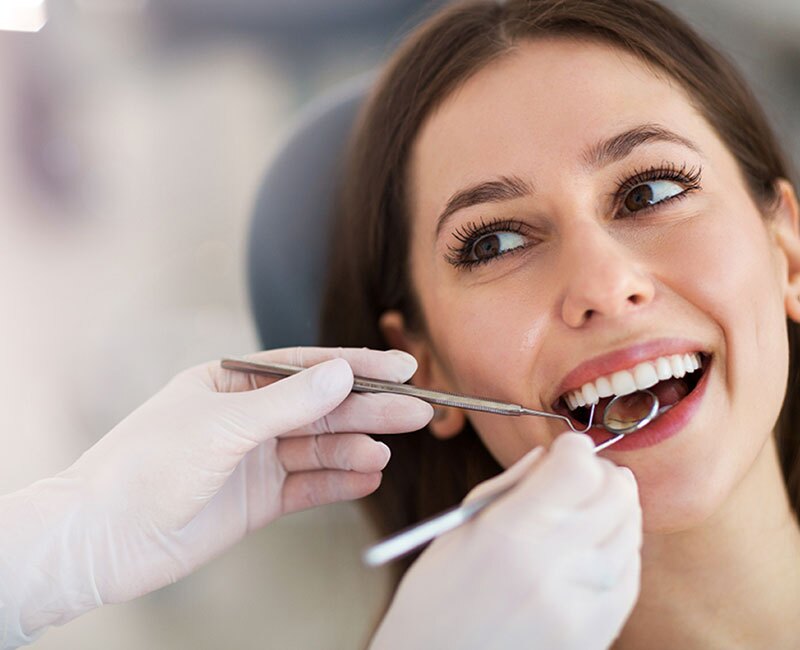Dental Cleanings in SE Calgary
Dental Cleanings in SE Calgary
Dental Cleanings & Check-ups at Destination Dental
The Importance of Dental Cleanings
Dental cleanings are essential to keeping your teeth and gums healthy. The longer you leave plaque and tartar on your teeth, the more susceptible you are to cavities and gum disease. If the tartar builds up around your gum line, bacteria can make their way under your gums and cause an infection. Typically, there is no pain during the early stages of gum disease, which is why many patients are unaware they have it or leave it untreated. However, gingivitis will slowly develop into periodontitis, which is irreversible. When gum disease progresses to advanced or chronic periodontitis, it can lead to bone or tooth loss. That’s why frequently visiting your dentist near you in Inglewood is crucial. Your dentist will detect oral health problems in the early stages and treat them before they develop into more serious issues.
What to Expect at Your Cleaning Appointment
We provide dental cleanings near you to keep your teeth clean and healthy. When you receive a dental cleaning in Inglewood, the appointment is typically around an hour, depending on how much buildup you have. During a cleaning, we will:
Periodontal Assessment: Our hygienist will complete a full assessment to determine the health of your gums and bone level to understand the foundation that supports your teeth and determine if there are abnormalities.
Scale your teeth: Our hygienist will use an ultrasonic and hand instruments to remove the plaque and tartar from your teeth.
Polish your teeth: A polishing cup will be used to remove any residual plaque and surface staining.
Floss your teeth: We will floss and clean all the crevices between your teeth.
Fluoride treatment: We will provide a fluoride treatment to strengthen your teeth and protect them from cavities.
After your cleaning, our dentist will examine your teeth and gums for any abnormalities. If you have any questions or concerns, you can discuss them with your dentist during this time.
Why Choose Us?
Our dental clinic offers a wide range of dental services, allowing us to address all aspects of your oral health. From cleanings and check-ups to restorative and cosmetic treatments, we provide comprehensive care to meet your dental needs.
Maintaining Your Oral Health
In addition to regular dental cleanings, it’s important to practice good oral hygiene on a daily basis. When you thoroughly brush and floss your teeth, you reduce the plaque buildup, which will reduce the likelihood of developing cavities and gum disease. The following tips should be followed to achieve optimal oral health:
- Brush for at least two minutes twice a day
- Floss at least once a day
- Rinse your mouth after a snack or meal
- Clean your tongue with a tongue brush or scraper
- Schedule a dental cleaning in Inglewood every six months (or every three months if periodontal disease is a concern)
Frequently Asked Questions
It is generally recommended to have a dental cleaning and check-up every six months. However, the frequency may vary depending on your oral health needs. Our dental team will assess your specific situation and provide personalized recommendations.
Dental cleanings are usually painless. You may experience some slight discomfort or sensitivity during the cleaning process, especially if there is a significant buildup of tartar. Our dental team takes measures to ensure your comfort throughout the procedure.
Dental cleanings can remove surface stains and make your teeth appear brighter. However, for more significant teeth whitening results, we offer professional teeth whitening treatments as a separate service.
The duration of your appointment will depend on various factors, including the condition of your teeth and gums. On average, a dental cleaning and check-up appointment may take around one hour.
Yes, dental cleanings and check-ups allow our dental team to detect a wide range of oral health issues, including gum disease, oral cancer, bite problems, and signs of teeth grinding. Early detection leads to prompt treatment and better outcomes.
